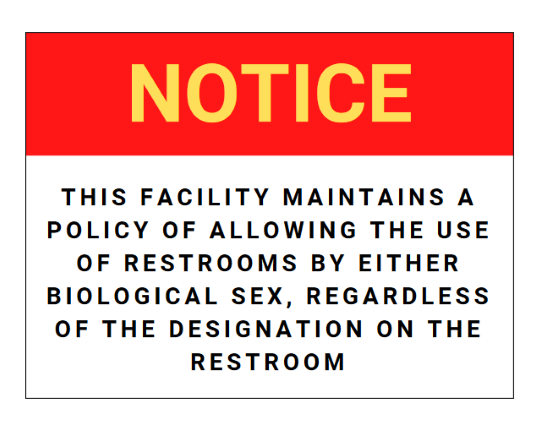Federal judge strikes down sign law requiring transgender bathroom warnings

Image from the Bongo Productions v. Lawrence case's exhibits.
A federal judge in Nashville, Tennessee, has struck down a state law requiring businesses to post warning signs if they allow transgender people to use restrooms that match their gender identity.
U.S. District udge Aleta A. Trauger of the Middle District of Tennessee ruled on behalf of restaurant owner Bob Bernstein and his company, Bongo Productions, in a May 17 opinion. The American Civil Liberties Union summarized the decision here and summarized the case here.
Trauger said the sign mandate violates the First Amendment because it compels private, nonfactual speech of a controversial nature, requiring the plaintiffs to “voice a message to which they earnestly object.”
“It would do a disservice to the First Amendment to judge the act for anything other than what it is: a brazen attempt to single out trans-inclusive establishments and force them to parrot a message that they reasonably believe would sow fear and misunderstanding about the very transgender Tennesseans whom those establishments are trying to provide with some semblance of a safe and welcoming environment,” Trauger wrote.
Bernstein is owner of Fido, a Nashville, Tennessee, restaurant that sought to provide a welcoming environment for the LGBTQ community. Fido has three restrooms, including two multiple-user restrooms with sex designations. The restaurant’s informal policy was to allow people to use the restroom that best matches their gender identity.
The Tennessee law, which took effect in July 2021, required businesses open to the public to post a notice if they allow members of either biological sex to use restrooms designated for a specific sex.
The “garish warning sign” had to be at least eight inches wide and six inches tall, and the top one-third had to have a background color of red with the word “Notice” in yellow text—a “cartoonishly alarmist color scheme,” Trauger said.
The message in bold-face block letters on the bottom two-thirds of the sign had to read: “This facility maintains a policy of allowing the use of restrooms by either biological sex, regardless of the designation on the restroom.”
Trauger said the signs are potentially misleading because they imply that a business with a transgender-inclusive policy allows any person to use any restroom, even though that is not the business’s aim.
Trauger used a strict scrutiny standard to evaluate the law. If the signs were purely factual, a less demanding level of scrutiny would have applied.
The law “does not simply require a facility to accurately disclose its policies; it requires the facility to voice the government’s characterization of those policies,” Trauger wrote. “The warning mandated by the act requires the plaintiffs to adopt and, by extension, endorse the government’s preferred but unambiguously contested view of how gender works.”
The case is Bongo Productions v. Lawrence.



